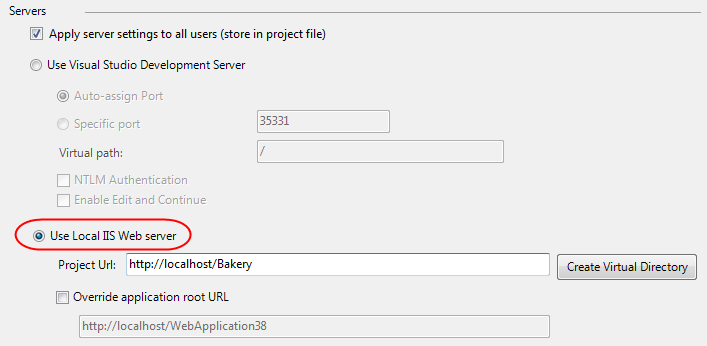Developers today build and test ASP.NET sites and applications using one of two web-servers:The ASP.NET Development Server that comes built-into Visual Studio
The IIS Web Server that comes built-into Windows
Both of the above options have their pros and cons, and many ASP.NET developers have told us: “I wish I could have the ease of use of the ASP.NET Development Server, but still have all the power and features of IIS”. Today I’m happy to announce a new, free option that we are enabling – IIS Express - that combines the best characteristics of both, and which will make it easier to build and run ASP.NET sites and applications. IIS Express will work with VS 2010 and Visual Web Developer 2010 Express, will run on Windows XP and higher systems, does not require an administrator account, and does not require any code changes to use. You will be able to take advantage of it with all types of ASP.NET applications, and it enables you to develop using a full IIS 7.x feature-set. How Things Work TodayBefore I get into the details of IIS Express, let’s first quickly review how the ASP.NET Development Server and IIS options work today.ASP.NET Development Server Visual Studio’s built-in ASP.NET Development Server (also known as “Cassini”) has the benefit of being light-weight and easy to quickly run. It doesn’t listen on remote ports (which makes it easier to get approved for many corporate security environments), works even when you are running under a non-administrator account, and doesn’t require a separate installation step. The fact that it is so easy to get running is a huge positive of it – and the reason it is the default web-server used by ASP.NET projects in Visual Studio when you press F5 to run them:
IIS Express – The Best of Both Options We have been working on a new flavor of IIS 7.x that is optimized for developer scenarios that we are calling “IIS Express”. We think it combines the ease of use of the ASP.NET Web Server with the full power of IIS. Specifically: It’s lightweight and easy to install (less than 10Mb download and a super quick install)
It does not require an administrator account to run/debug applications from Visual Studio
It enables a full web-server feature set – including SSL, URL Rewrite, Media Support, and all other IIS 7.x modules
It supports and enables the same extensibility model and web.config file settings that IIS 7.x support
It can be installed side-by-side with the full IIS web server as well as the ASP.NET Development Server (they do not conflict at all)
It works on Windows XP and higher operating systems – giving you a full IIS 7.x developer feature-set on all OS platforms
IIS Express (like the ASP.NET Development Server) can be quickly launched to run a site from a directory on disk. It does not require any registration/configuration steps. This makes it really easy to launch and run for development scenarios.
Read more: ScottGu's Blog
The IIS Web Server that comes built-into Windows
Both of the above options have their pros and cons, and many ASP.NET developers have told us: “I wish I could have the ease of use of the ASP.NET Development Server, but still have all the power and features of IIS”. Today I’m happy to announce a new, free option that we are enabling – IIS Express - that combines the best characteristics of both, and which will make it easier to build and run ASP.NET sites and applications. IIS Express will work with VS 2010 and Visual Web Developer 2010 Express, will run on Windows XP and higher systems, does not require an administrator account, and does not require any code changes to use. You will be able to take advantage of it with all types of ASP.NET applications, and it enables you to develop using a full IIS 7.x feature-set. How Things Work TodayBefore I get into the details of IIS Express, let’s first quickly review how the ASP.NET Development Server and IIS options work today.ASP.NET Development Server Visual Studio’s built-in ASP.NET Development Server (also known as “Cassini”) has the benefit of being light-weight and easy to quickly run. It doesn’t listen on remote ports (which makes it easier to get approved for many corporate security environments), works even when you are running under a non-administrator account, and doesn’t require a separate installation step. The fact that it is so easy to get running is a huge positive of it – and the reason it is the default web-server used by ASP.NET projects in Visual Studio when you press F5 to run them:

IIS Express – The Best of Both Options We have been working on a new flavor of IIS 7.x that is optimized for developer scenarios that we are calling “IIS Express”. We think it combines the ease of use of the ASP.NET Web Server with the full power of IIS. Specifically: It’s lightweight and easy to install (less than 10Mb download and a super quick install)
It does not require an administrator account to run/debug applications from Visual Studio
It enables a full web-server feature set – including SSL, URL Rewrite, Media Support, and all other IIS 7.x modules
It supports and enables the same extensibility model and web.config file settings that IIS 7.x support
It can be installed side-by-side with the full IIS web server as well as the ASP.NET Development Server (they do not conflict at all)
It works on Windows XP and higher operating systems – giving you a full IIS 7.x developer feature-set on all OS platforms
IIS Express (like the ASP.NET Development Server) can be quickly launched to run a site from a directory on disk. It does not require any registration/configuration steps. This makes it really easy to launch and run for development scenarios.

Read more: ScottGu's Blog
Read more: IIS Express



0 comments:
Post a Comment